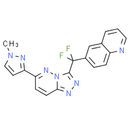Description
JNJ-38877605 is an orally bioavailable, small-molecule receptor tyrosine kinase inhibitor with potential antineoplastic activity. c-Met inhibitor JNJ-38877605 selectively inhibits c-Met (mesenchymal-epithelial transition), a receptor tyrosine kinase (RTK) involved in cancer cell survival and invasiveness, and tumor angiogenesis. c-Met is also known as hepatocyte growth factor receptor (HGFR).
Product information
CAS Number: 943540-75-8
Molecular Weight: 377.35
Formula: C19H13F2N7
Synonym:
JNJ38877605
JNJ 38877605
Chemical Name: 6-(difluoro(6-(1-methyl-1H-pyrazol-3-yl)-[1, 2, 4]triazolo[4, 3-b]pyridazin-3-yl)methyl)quinoline
Smiles: CN1C=CC(=N1)C1C=CC2=NN=C(N2N=1)C(F)(F)C1C=C2C=CC=NC2=CC=1
InChiKey: HUWHDIWESZXGII-UHFFFAOYSA-N
InChi: InChI=1S/C19H13F2N7/c1-27-10-8-16(25-27)15-6-7-17-23-24-18(28(17)26-15)19(20,21)13-4-5-14-12(11-13)3-2-9-22-14/h2-11H,1H3
Technical Data
Appearance: Solid Power
Purity: ≥98% (or refer to the Certificate of Analysis)
Solubility: DMSO: 37 mg/mL(98.05 mM). Water: Insoluble.
Shipping Condition: Shipped under ambient temperature as non-hazardous chemical or refer to Certificate of Analysis
Storage Condition: Dry, dark and -20 oC for 1 year or refer to the Certificate of Analysis.
Shelf Life: ≥12 months if stored properly.
Stock Solution Storage: 0 - 4 oC for 1 month or refer to the Certificate of Analysis.
Drug Formulation: To be determined
HS Tariff Code: 382200
How to use
In Vitro:
JNJ-38877605 shows more than 600-fold selectivity for c-Met compared with more than 200 other diverse tyrosine and serine-threonine kinases and also potently inhibits HGF-stimulated and constitutively activated c-Met phosphorylation in vitro. In EBC1, GTL16, NCI-H1993, and MKN45 cells, JNJ-38877605 (500 nM) leads to a significant reduction of phosphorylation of Met and RON, another key player in invasive growth. A recent study shows that JNJ-38877605 is involved in modulating secretion of IL-8, GROa, uPAR and IL-6 in GTL16 cells.
In Vivo:
In mice bearing established GTL16 xenografts, JNJ-38877605, dosed orally with 40 mg/kg/day for 72 hours, results in a statistically significant decrease in the plasma levels of human IL-8 (from 0.150 ng/mL to 0.050 ng/mL) and GROα (from 0.080 ng/mL to 0.030 ng/mL). While concentrations of uPAR in the blood become reduced to more than 50% at the same dose.
References:
- Torti D, et al. Int J Cancer. 2012, 130(6), 1357-1366.
- De Bacco F, et al. J Natl Cancer Inst. 2011 Apr, 103(8), 645-661.
- Perera T, et al. Presented at the 99th AACR Annual Meeting; 2008 Apr 12-16; San Diego (CA): Abst
Products are for research use only. Not for human use.
Payment & Security
Your payment information is processed securely. We do not store credit card details nor have access to your credit card information.


